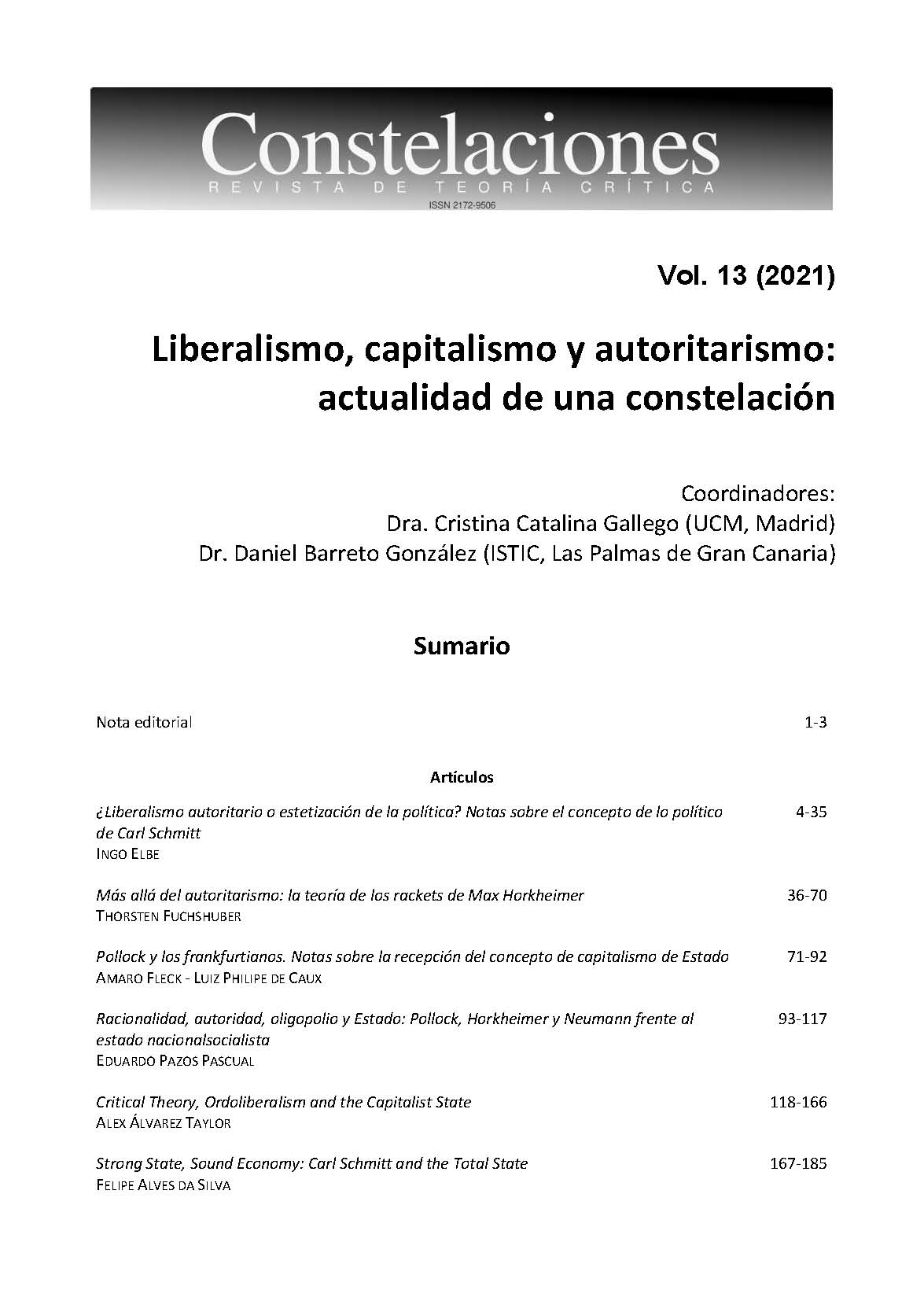For a Critical Theory of Authoritarianism: Formal democracy and bourgeois relationships of domination
Keywords:
liberal democracy, authoritarianism, authoritarian personality, domination, neoliberalismAbstract
The text begins with a reconstruction of the relationship between liberal democracy and authoritarianism based on some of Adorno’s works about the research on the authoritarian personality, showing how the passage between those moments should be understood by the formal limitations of the first. Then, Horkheimer's concept of authority will be reconstructed, as it complements and deepens the theses developed by Adorno. Finally, the essay contains provisional reflections on the possibility of using the concepts of critical theory to understand the links between the transformations of the neoliberal period and the rise of authoritarian and extreme right movements.
Downloads
References
ADORNO, Theodor (2020): Aspectos do Novo Radicalismo de Direita, trad. de Felipe Catalani, São Paulo: Editora Unesp.
ADORNO, Theodor (2019a): “Remarks on The Authoritarian Personality”, em Theodor W. Adorno et al., The Authoritarian Personality, London/New York: Verso, XLI-LXVI.
ADORNO, Theodor (2019b): Estudos sobre a Personalidade Autoritária, trad. de Virgínia Helena Ferreira da Costa, Francisco López Toledo Corrêa, Carlos Henrique Pissardo, São Paulo: Editora Unesp.
ADORNO, Theodor (2015): “Teoria freudiana e o padrão da propaganda fascista”, em Ensaios sobre Psicologia Social e Psicanálise, trad. de Verlaine Freitas, São Paulo: Editora Unesp, 153-190.
ADORNO, Theodor (2008): Educação e Emancipação, trad. de Wolfgang Leo Maar, Rio de Janeiro: Paz e Terra.
ADORNO, Theodor (1976): “Introdução à controvérsia sobre o positivismo na sociologia alemã”, trad. de Wolfgang Leo Maar, em Textos Escolhidos, São Paulo: Abril Cultural, 215-264.
ADORNO, Theodor (1965): “Democratic Leadership and Mass Manipulation”, em Alvin W. Gouldner (ed.), Studies in Leadership. Leadership and democratic action, New York: Russell and Russell, 418-438.
ADORNO, Theodor W et al. (2019): “Introdução”, em Estudos sobre a Personalidade Autoritária, trad. de Carlos Henrique Pissardo, São Paulo: Editora Unesp, 71-120.
DARDOT, Pierre e LAVAL, Christian (2016): A Nova Razão do Mundo. Ensaio sobre a sociedade neoliberal, trad. de Mariana Echalar, São Paulo: Boitempo Editorial.
DE MARIA, Fábio (2021): “Fromm and Horkheimer: on the fundamentals of critical theory’s anthropology”, em Fromm Forum, no. 25, 42-62.
DEMIROVI?, Alex (2018): “El populismo autoritario como estrategia neoliberal de gestión de la crisis”, trad. de José A. Zamora, em Constelaciones. Revista de Teoria Crítica, no. 10, 116-134.
DEMIROVI?, Alex (2010): “Continuar, ou o que significa falar da atualidade da teoria crítica”, trad. de Stefan Klein, em Remate de Males, vol. 30, n. 1, 9-24.
GRESPAN, Jorge (2019): Marx e a Crítica do Modo de Representação Capitalista, São Paulo: Boitempo Editorial.
HORKHEIMER, Max (1990): Teoria Crítica. Uma documentação, tomo 1, trad. de Hilde Cohn, São Paulo: Perspectiva.
HORKHEIMER, Max e ADORNO, Theodor W. (1985): Dialética do Esclarecimento, trad. de Guido de Almeida, Rio de Janeiro: Jorge Zahar Editores.
LEVITSKY, Steven e ZIBLATT, Daniel (2018): Como as Democracias morrem?, trad. de Renato Aguiar, Rio de Janeiro: Zahar.
MARCUSE, Herbert (1981): Ideias para uma Teoria Crítica da Sociedade, trad. de Fausto Guimarães, Rio de Janeiro: Zahar Editores.
MARIOTTI, Shannon L. (2016): Adorno and Democracy. The American years, Lexington: The University Press of Kentucky.
MARX, Karl (1983): O Capital. Crítica da economia política, livro I, vol. 1, trad. de Regis Barbosa e Flávio Kothe, São Paulo: Abril Cultural.
MORELOCK, Jeremiah (ed.) (2018): Critical Theory and Authoritarian Populism, London: University of Westminster Press.
NEUPERT-DOPPLER, Alexander (2018): “Society and Political Form”, trad. de Niall Bond e Werner Bonefeld, em Beverley Best, Werner Bonefeld, Chris O’Keane (ed.), The SAGE Handbook of Frankfurt School Critical Theory, vol. 2, London, SAGE, 816-833.
NOERR, Gunzelin Schmid (2014): “Zur kritischen Theorie des psychischen und politischen Autoritarismus”, em Ulrich Ruschig e Hans-Ernst (eds.), Staat und Politik bei Adorno und Horkheimer, Baden-Baden, Nomos, 41-59.
RUSCHIG, Ulrich e SCHILLER, Hans-Ernst (eds.) (2014): Staat und Politik bei Adorno und Horkheimer, Baden-Baden, Nomos.
STREECK, Wolfgang (2018): Tempo Comprado. A crise adiada do capitalismo democrático, trad. de Marian Toldy e Teresa Toldy, São Paulo: Boitempo Editorial.
VASCONCELLOS, Caio e PUZONE, Vladimir (2018): “Estática e dinâmica do capitalismo tardio na teoria crítica”, em Tempo Social, vol. 30, n. 3, 85-102.
Downloads
Published
How to Cite
Issue
Section
License
Copyright (c) 2021 Vladimir Puzone

This work is licensed under a Creative Commons Attribution-NonCommercial-ShareAlike 4.0 International License.
Authors who have publications with this journal accept the following terms:
1. Authors will retain their copyright and grant the journal the right of first publication of their work, which will be simultaneously subject to the License of recognition of Creative Commons CC BY-NC-SA 4.0 that allows third parties to share, redistribute and adapt the work provided it is for non-commercial purposes and its author and first publication in this journal is indicated.
2. Authors may adopt other non-exclusive distribution license agreements for the version of the published work (e.g., depositing it in an institutional electronic archive or publishing it in a monographic volume) provided that the initial publication in this journal is indicated.
3. Authors are permitted and encouraged to disseminate their work via the Internet (e.g., in institutional telematic archives or on their website) before and during the submission process, which can produce interesting exchanges and increase citations of the published work. (See The Effect of Open Access).
Data confidentiality
1. Constelaciones. Revista de Teoría Crítica guarantees that the data you send us will only be used to meet the requests made in this message.
2. Your data will not be passed on to third parties.
3. You may request that your data be removed from our records at any time.





